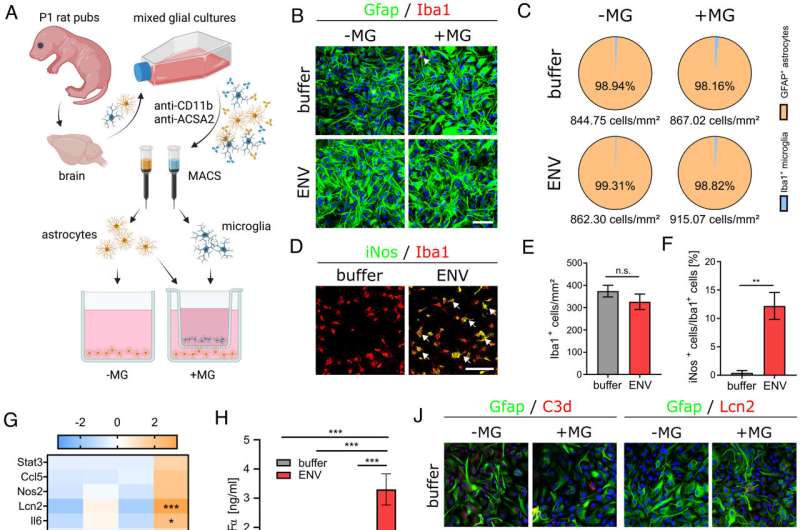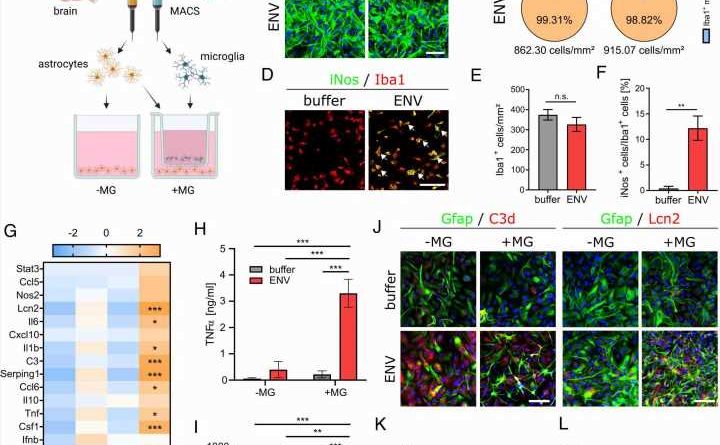Study substantiates the neuropathogenic role of the HERV-W protein in multiple sclerosis

GeNeuro, a biopharmaceutical company developing treatments for neurodegenerative and autoimmune diseases such as multiple sclerosis (MS), amyotrophic lateral sclerosis (ALS) and the severe neuro-psychiatric consequences of COVID-19 (post-COVID or long COVID), has published, in collaboration with the Heinrich-Heine University in Düsseldorf, results from their joint research on the role of HERV-W in MS in the Proceedings of the National Academy of Science.
In collaboration with colleagues from Switzerland and France, the Düsseldorf research team led by Prof. Patrick Küry (Department of Neurology) made important progress in understanding the complex disease mechanism by describing a direct functional connection between the release of an endogenous retrovirus and the worsening of neurodegenerative processes.
Previous studies by Prof. Patrick Küry’s team were able to demonstrate a possible influence of HERV-W on neurodegeneration and on the reduction of the regeneration capacity (via oligodendroglial cells)—two processes that are not addressed by approved drugs to treat MS. The new findings by this team resulted from the use of a novel mouse model that mimics the expression of HERV-W in the central nervous system (CNS).
The research has now been able to prove that W-Env is indeed involved in important MS sub-processes in vivo: damage to the white matter (myelin) and a further weakening of the already impaired regeneration capacity.
In addition, the occurrence of aggressive microglial cells was confirmed and, surprisingly, the generation of neurotoxic astrocytes was revealed. This is a widespread glial cell population that is naturally involved in many physiological functions, but which, as a result of the presence of W-Env in the brain, now appears to acquire a primarily neurotoxic character.
“Our study shows that the presence of W-Env in the brains of MS patients appears to generate a toxic environment. It cannot be determined from this data whether this actually initiates the MS disease process, because the model we used is not suitable for this. However, it has now been clearly demonstrated for the first time that the W-Env increases the decay processes and disrupts the sensitive regeneration processes,” said Joel Gruchot, from the Heinrich-Heine-University Düsseldorf’s department of Neurology and lead author of the publication.
He added that “after GeNeuro’s two clinical studies with its W-Env neutralizing antibody called Temelimab, we can now explain why neurodegeneration successfully decreased in MS patients treated with Temelimab: the antibody appears to neutralize the ‘toxic’ W-Env protein and thus prevents its activity in the CNS as well as the neurotoxic activation of microglia and astrocytes.”
In addition to MS, GeNeuro is also testing Temelimab in a Phase II clinical trial in long COVID patients, as activation of W-Env is measured in the blood of affected patients, which may explain some of the neurological deficits suffered by these patients.
More information:
Joel Gruchot et al, Transgenic expression of the HERV-W envelope protein leads to polarized glial cell populations and a neurodegenerative environment, Proceedings of the National Academy of Sciences (2023). DOI: 10.1073/pnas.2308187120
Journal information:
Proceedings of the National Academy of Sciences
Source: Read Full Article
